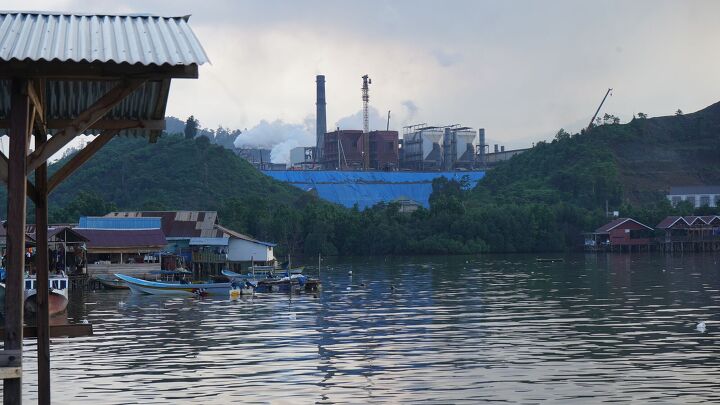Indonesia is Suffering the Consequences of China's EV Explosion

Electric vehicle naysayers love to talk about the environmental impact of mining raw materials for batteries. While those arguments are often rooted in some degree of truth, they’re generally made as the only argument and are levied without much evidence for support. Though it’s true that mining and processing nickel, cobalt, lithium, and other materials is awful for the environment, we’re learning more about the geopolitical and financial implications of the practice.
Jalopnik reported that a Chinese nickel refinery’s operation in Indonesia is destroying the local ecosystem and accelerating the decline in natural habitats for wildlife. The Indonesia Morwali Industrial Park is located on a large island in the country and has released so much pollution over the last ten years that locals can’t fish or use the water.
People report warming waters and fewer fish, and in some cases, the once-bountiful rivers have turned into trickling streams of mud. Workers at the facility report sickness from inhaling chemicals and ash from the mining processes. For China, the impacts are far away and seemingly unimportant. Its financial resources and size give it a great deal of power in the arrangement, as the giant nation has invested billions and amassed a 61 percent stake in the total nickel production.
As Jalopnik pointed out, the negative impacts of this partnership are felt solely by Indonesia. China is some 5,000 miles away from the island nation and has little concern for the destruction happening so far from its doorstep. As demand for electric vehicles accelerates, we’re likely to hear about more of these situations, and other such problems are going on right now.
Earlier this year, Tesla agreed to invest billions of dollars in nickel and a potential battery factory in the country over the next few years. It seems odd that Indonesia would continue pursuing such investments, knowing the havoc they wreak on its environment. Still, it’s likely tough for the country’s leaders to ignore the goldmi-I mean, nickel mine under their feet.
[Image: jafriyalbule via Shutterstock]
Become a TTAC insider. Get the latest news, features, TTAC takes, and everything else that gets to the truth about cars first by subscribing to our newsletter.

Chris grew up in, under, and around cars, but took the long way around to becoming an automotive writer. After a career in technology consulting and a trip through business school, Chris began writing about the automotive industry as a way to reconnect with his passion and get behind the wheel of a new car every week. He focuses on taking complex industry stories and making them digestible by any reader. Just don’t expect him to stay away from high-mileage Porsches.
More by Chris Teague
Latest Car Reviews
Read moreLatest Product Reviews
Read moreRecent Comments
- Probert They already have hybrids, but these won't ever be them as they are built on the modular E-GMP skateboard.
- Justin You guys still looking for that sportbak? I just saw one on the Facebook marketplace in Arizona
- 28-Cars-Later I cannot remember what happens now, but there are whiteblocks in this period which develop a "tick" like sound which indicates they are toast (maybe head gasket?). Ten or so years ago I looked at an '03 or '04 S60 (I forget why) and I brought my Volvo indy along to tell me if it was worth my time - it ticked and that's when I learned this. This XC90 is probably worth about $300 as it sits, not kidding, and it will cost you conservatively $2500 for an engine swap (all the ones I see on car-part.com have north of 130K miles starting at $1,100 and that's not including freight to a shop, shop labor, other internals to do such as timing belt while engine out etc).
- 28-Cars-Later Ford reported it lost $132,000 for each of its 10,000 electric vehicles sold in the first quarter of 2024, according to CNN. The sales were down 20 percent from the first quarter of 2023 and would “drag down earnings for the company overall.”The losses include “hundreds of millions being spent on research and development of the next generation of EVs for Ford. Those investments are years away from paying off.” [if they ever are recouped] Ford is the only major carmaker breaking out EV numbers by themselves. But other marques likely suffer similar losses. https://www.zerohedge.com/political/fords-120000-loss-vehicle-shows-california-ev-goals-are-impossible Given these facts, how did Tesla ever produce anything in volume let alone profit?
- AZFelix Let's forego all of this dilly-dallying with autonomous cars and cut right to the chase and the only real solution.


































Comments
Join the conversation
Chinese battery manufacturers like BYD and CATL are quickly transitioning to lower-cost LiFePO4 chemistry. That does away with the need for nickel and cobalt in batteries.
But if people are really concerned, they can stop buying stainless steel appliances, as stainless steel alloys consume the majority of nickel. And avoid everything "chrome" plated, which has a thick plating of nickel and a very thin layer of chromium on the top.
The problem lies with poor safety and environmental practices not the minerals or products being manufactured.